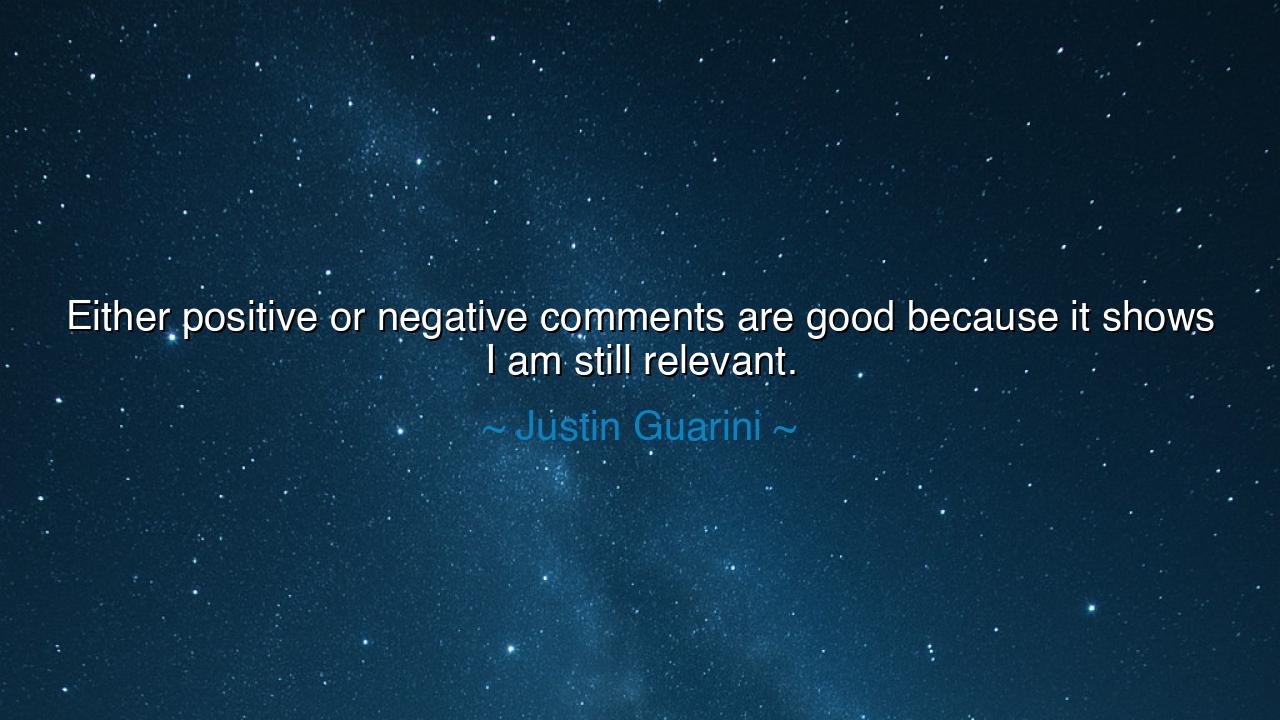
Either positive or negative comments are good because it shows I






Hear the voice of Justin Guarini, who declared with humility and insight: “Either positive or negative comments are good because it shows I am still relevant.” In these words is hidden a deep truth about the nature of influence, recognition, and the measure of one’s presence in the world. For to be spoken of—whether in praise or in criticism—is to still have a place in the thoughts of others, to still stir emotion, to still matter. Silence, not negativity, is the true death of relevance.
To receive positive comments is a joy. They affirm the good we have done, the inspiration we have given, the beauty or strength others have seen in us. Yet even negative comments carry meaning. They testify that what we have said or done has moved the hearts of others, even if it stirred disagreement or resistance. Better to be wrestled with than ignored. In this way, Guarini teaches that relevance is measured not in the unbroken applause of the crowd, but in the fact that one’s voice is still heard, one’s presence still felt.
History gives us striking examples. Consider Galileo Galilei, who was praised by some as a genius and condemned by others as a heretic. His discoveries provoked both admiration and fierce criticism, yet the very storm of words around him proved his relevance. Centuries later, his name shines as a beacon of truth, remembered precisely because he was not ignored. His life shows that controversy itself can be a sign of enduring importance.
So too in the life of Martin Luther King Jr., who inspired millions with his message of justice and peace. He was exalted with words of love by those who longed for freedom, yet reviled by others who feared change. Both the positive and negative voices rose against him, and together they proved the weight of his influence. His relevance was undeniable, for he could not be silenced, and his legacy grew ever brighter through the clash of opinions he evoked.
The meaning of Guarini’s words is thus: to live a life that matters is to provoke response. If all you meet with is silence, then perhaps your voice has not yet reached the hearts of others. But if your words, your deeds, your art awaken joy in some and discomfort in others, then you are alive in the world’s consciousness. Relevance is not perfection; it is presence. It is to still stir the waters, rather than sink unnoticed beneath them.
The lesson for us is clear: do not fear criticism, and do not cling only to praise. See them both as signs that your presence still echoes. What matters most is not universal approval but authentic expression, lived boldly and shared openly. Better to be debated than forgotten; better to stir the soul than to leave no trace. Relevance is the mark of engagement with life, and engagement requires the courage to be seen.
Practical wisdom calls us to three acts. First, accept positive feedback with gratitude, but do not become enslaved to it. Second, welcome negative feedback with courage, and let it sharpen your craft or strengthen your resolve. Third, live in such a way that your presence cannot be ignored—speak your truth, pursue your work, and pour yourself into the world so that your relevance endures.
So let it be remembered: both praise and criticism are winds that prove the flame of your life still burns. The danger lies not in being loved or hated, but in being forgotten. Justin Guarini’s words are a call to embrace the full spectrum of response, to see in it the proof that your voice matters, that your life touches others, and that you still walk in the realm of the living, relevant to the world that surrounds you.






PTNguyen Phuong Thao
This is such an interesting comment about fame and relevance. It shows how artists often have to redefine success beyond just approval. Still, I wonder how sustainable this mindset is. Can someone truly find peace when both praise and criticism are seen as equally validating? Or does it eventually create a cycle where being talked about becomes more important than personal growth?
LHLinh Huong
What I like about this view is its resilience — the ability to turn criticism into a form of motivation. It’s a practical mindset for someone in a public career. However, I also question whether normalizing negative attention can lead to emotional detachment. Does embracing all feedback equally risk dulling one’s sensitivity to meaningful critique or genuine connection with audiences?
TMLe Thi Man
This quote makes me think about how fame changes one’s relationship with feedback. The idea that even negativity signals relevance seems both empowering and a little sad. Should attention really be the ultimate measure of significance? I understand the logic, but it also makes me wonder if true value lies in being discussed or in genuinely influencing people for the better.
PQPham Quyen
I find this take quite refreshing and realistic. Not everyone can handle criticism so openly. It shows a level of maturity to see negative comments as validation of presence rather than failure. Still, I’m curious — at what point does criticism stop being useful feedback and start becoming toxic noise? Can too much focus on public perception erode an artist’s authenticity?
TBNgoc Tran Bao
This perspective feels very grounded, especially coming from someone in the entertainment industry. It’s true that public attention, whether praise or criticism, can be a sign of cultural impact. But I wonder — does constantly valuing relevance risk tying one’s self-worth to external opinions? Staying visible might be important professionally, but emotionally, that could become exhausting over time.